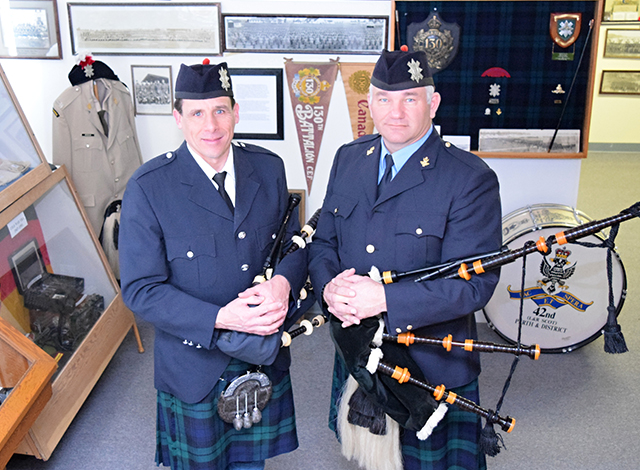
Photo credit: Google Maps screengrab.
118 viewsPosted on: April 29, 2020
From its beginnings as a British-influenced military town in 1816, Perth citizens continued to march through two World Wars with the 42nd Field Artillery Regiment and its various incarnations. Many area residents served, so the ties between the regiment and the town were strong.
Then came the top-secret military base during the cold war, located in the former Drummond Township. Richardson Detachment of CFB Carp was opened in 1962, and many of our population worked there until 1994.
Although there is no official military presence here now, two members of the 42nd Pipe Band carry on to remind us of our strong connection to the 42nd Regiment. The band is known as the 42nd Pipe Band, and consists of Stacey Niceliu and Chris Gilbertson. Although it is not officially attached to any military unit, it is a descendant of the old 42nd Pipe & Drum Band.
Those band members practice diligently at the Perth Legion weekly, so if you are going by the Beckwith Street facility and hear the bagpipes wailing, please give a salute towards the upstairs level in honour of the 42nd.
Even though the band members are not officially attached to the 42nd, Niceliu served from 1991 to 1993, and is currently a member of the Lanark & Renfrew Scottish Regiment Association. He has been in the band since 1991, when he came to Perth from the Argyll and Sutherland Highlanders of Hamilton.
Much of the history of the regiment was gleaned from the association website at www.highlandgunner.ca/, and the following is a brief history of one of the oldest Canadian regiments, which began as the 42nd Brockville Battalion of Infantry on Oct. 5, 1866 in Brockville, with companies also in Almonte, Perth, Fitzroy, Lansdowne, and Smiths Falls. In 1870, the Battalion took part in the Fenian Raids and the Red River Expedition, and in 1871 the Pembroke Infantry Company became the Battalion’s seventh Company.
They were designated in 1987 as the 42nd Lanark and Renfrew Battalion of Infantry, and became the 42nd Lanark and Renfrew Regiment on May 8, 1900. That 42nd designation stuck until March 12, 1920, when the unit became The Lanark and Renfrew Regiment: 1st Battalion (130th Battalion CEF) and 2nd Reserve Battalion (240th Battalion CEF), and then in 1927 The Lanark and Renfrew Scottish Regiment.
The regiment mobilized after the start of World War II in 1939 and later was divided into two battalions, with the 1st Battalion put into active service as home defence on both coasts, until disbanded in October of 1943.
In July 1944, the 1st Light Anti-Aircraft Regiment in Italy was reorganized, and became the 1st Light Anti-Aircraft Infantry Battalion. On Nov. 11, 1944, it was re-designated as The Lanark and Renfrew Scottish Regiment, and went on to serve in Italy and France. In 1945 it was converted back to Artillery and became the 1st Light Anti-Aircraft Regiment (Lanark and Renfrew Scottish).
April 1, 1946, saw another conversion to air defence artillery, and they were designated as the 59th Light Anti-Aircraft Regiment (Lanark and Renfrew Scottish), RCA. The regiment returned to its infantry roots on Dec. 1, 1959, and was designated as The Lanark and Renfrew Scottish Regiment.
The name changes kept coming, and in 1992 the regiment converted to artillery air defence, and was designated as the 1st Air Defence Regiment (Lanark and Renfrew Scottish), RCA. Then in 2006, it was converted back to field artillery and became 42nd Field Regiment (Lanark and Renfrew Scottish), RCA. According to Niceliu the regiment has a strength today of approximately 70 men and a few artillery pieces.
If all this sounds complicated, well, it is. To fully understand the structure of the Canadian Army, past and present, you would have to live the life, either as a member or historian.
The armouries for the regiment in Perth for the period of 1935 to 1965 was the building which is now the Asbury Free Methodist Church, located on Gore St. near Craig. It should be noted here that an armouries refers to a single building, and is a place where militia units meet to conduct their training. This usage of the word is uniquely Canadian. An armoury, on the other hand, is a place where weapons are stored, and two or more such places are armouries. Simple enough, right?
Perth War veteran Eric Devlin was Drum Major of the Lanark & Renfrew Scottish Pipes and Drums in 1992 and 1993, when the band was associated with the 1st Air Defence Regiment (Lanark and Renfrew Scottish), RCA. Other local connections were: CWO Ernest Joseph Hall, MMM, MSM, CD, of Lanark, who served as Regimental Sergeant Major from 2011 to 2013, and Perth’s Brian Noonan, who was Colonel of the Regiment from 1969 to 1971 with the rank of Lt-Col.
If you have any comments or suggestions, please email me at: terry@pdgmedia.ca
© Copyright 2025, All Rights Reserved